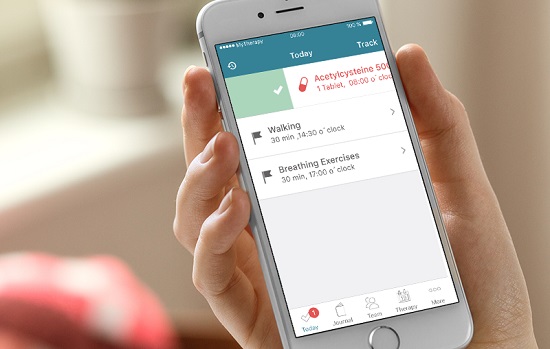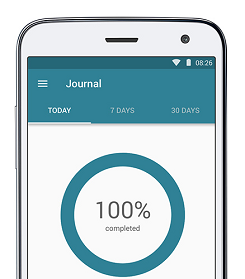An All-In-One Self-Tracking Medication Reminder App to Help You Manage Your Cystic Fibrosis
Treatment Plans for Cystic Fibrosis Vary from Person to Person. Find out How MyTherapy, Which Is Tailored to Your Individual Needs, Can Help You Manage Your Cf Treatment Plan

Cystic fibrosis (CF) is a lifelong, genetic condition that causes a thick, sticky build-up of mucus and other secretions in the lungs, pancreas, and other organs. In the lungs, the mucus clogs the airways and traps harmful bacteria, leading to recurrent lung infections, lung damage, and, over time, respiratory failure. In the pancreas, the build-up of mucus prevents the release of digestive enzymes that are needed to help the body digest food and absorb nutrients. This can then lead to serious bowel obstructions. As it currently stands, there is unfortunately no cure for CF. However, it is possible to control the disease with various forms of treatment. People living with CF need to work closely with their medical professionals and must consistently adhere to their treatment regimens. MyTherapy, a medication reminder and health tracker app developed by smartpatient, can offer support to CF patients by reminding them of important appointments and helping them manage their medication, diet, and symptoms. The app essentially breaks down complex treatment plans into simplified to-do lists, making it easier for those living with CF to stick to their treatment.
Adhering to a treatment plan isn’t always the easiest thing to do, especially when our minds are occupied with various stressors of everyday life. Remembering when and how to take certain medications can become complicated, particularly if dosages and times are frequently changing. When it comes to taking medication, skipping pills or accidentally overdosing are all-too real consequences of not having an adequate reminder plan in place. MyTherapy exists for this very reason: to help you, the cystic fibrosis patient, adhere to your medication strictly and responsibly. With the app, your smartphone is turned into both a pocket alarm and health journal that helps you take your medication correctly and on-time and allows you to track your symptoms, diet, and exercise goals. Furthermore, the alarm-reminder function can be used to tell you when your next doctors’ appointments are. No treatment regimen is too complex for MyTherapy, meaning that you can set numerous alarms each day and even change the times on weekends. The reminders will tell you when to take your medicine, how to take it (in terms of dose etc.), and if you should take it before or after a meal. This is particularly important when you need to take an enzyme capsule to aid digestion. Managing your treatment plan is as simple as scanning the barcode on your medication package and logging in data related to your daily health goals.
With the app’s health diary, you are able to track your symptoms and health measurements (such as breath frequency and volume), and set health goals (such as breathing/ fitness exercises). Importantly, the health diary and other recorded data can be printed out and shared with your doctors and specialists. This allows them to see how you are doing and if your treatment plan needs adjusting. The health diary is therefore a valuable tool that allows you to monitor your condition over long periods of time.
Lastly, the team at MyTherapy takes both user feedback and data privacy seriously. Apart from being safe in the knowledge that your data is protected by strict German privacy laws, you also have the option to set a passcode on the app so that only you may access it. We, at MyTherapy, consistently strive to make the app better for you, our user, so that you can focus on other, more meaningful things in your life without having to worry about your medication. The app can be used by any patient of any age living with cystic fibrosis.
Cy-Stick Fibrosis: A Condition That Affects the Lungs and Digestive System
Cystic fibrosis is an inherited condition that damages the lungs and the digestive system. It affects special cells that produce mucus, sweat, and digestive juices. Usually, these fluids are thin and slippery, but with CF, the fluids become thick and sticky, causing the blockage of airways, tubes, and ducts. Over time, the sticky mucus in the lungs traps harmful bacteria, which results in recurrent lung infections. This build-up of mucus also makes breathing difficult and causes damage to the lungs. Moreover, the thick, sticky mucus prevents important digestive enzymes, which are made in the pancreas, from reaching the small intestine. Without these enzymes, the body cannot absorb important fats and proteins, which may lead to malnutrition and other diet-related deficiencies. CF also increase the salt content of sweat, meaning that patients lose a lot of salt, which can lead to dehydration, increased heart rate, tiredness, or heat stroke.
The symptoms of CF vary from person to person and can be anything from mild too severe. Newborn babies often suffer from constipation or bowel obstruction. If CF is not treated, chronic bronchitis, pneumonia, or sinusitis can occur.
Liver problems, like liver cirrhosis, can also be a consequence of CF as the condition causes the blockage of bile ducts. Furthermore, CF can cause infertility. The abnormal production of thick mucus affects the functioning of a woman’s cervix and it is estimated that 98% of men with CF are unable to conceive naturally.
The Main Symptoms of CF Include:
- Recurrent lung infections
- Inflammation of the airways
- Breathing difficulties
- Chronic inflammation of the upper respiratory tract
- Persistent coughing that produces thick mucus
- Inflammations of the pancreas
- Serious bowel obstructions
- Diarrhea
- Poor weight gain and growth
- Diabetes
- Gallstones
- Fatty liver or liver cirrhosis
- Infertility
In addition to these symptoms, CF can also lead to various other health problems such as osteoporosis, diabetes, and swollen, painful joints.
Early Diagnosis in Neonates
In most cases, CF is diagnosed via screening tests that are carried out directly after birth. In England, a blood spot test is offered to all babies in order to detect various health problems – including cystic fibrosis – as early as possible. When the baby is between five and eight days old, a drop of blood is collected from its heel and sent to the laboratory for analysis. As this blood spot test is not 100% accurate, follow-up tests will be carried out if the blood spot tests indicate abnormalities. For CF, the two main additional diagnostic tests are a sweat test (which measures the amount of salt in the sweat) and a genetic test (in which a sample is checked for the defective gene which causes CF).
Although most tests are usually carried out with neonates (newborn babies), it is possible to test children and adults. In addition, some doctors may recommend that you do a test to check whether you are a “carrier” of the defective gene that causes CF. This is very important if you have a close relative or partner who has CF or who is a known carrier of CF.
Genetics: Who Gets CF and How?
Cystic fibrosis is an inherited condition, which means that it is caused by a genetic defect (mutation). The faulty gene in CF affects a protein that controls the movement of salt in and out of cells, causing the mucus to become thick and sticky instead of watery and slippery. Various mutations can occur and the type of mutation will determine the severity of the condition.
CF is present from birth and can only be passed on from parents to children (i.e. it isn’t contagious). Genes are inherited in pairs: you receive one copy from your father and one copy from your mother. Children only get CF if they receive two defective genes, one from each parent. Therefore, if you are diagnosed with CF, it means that both of your parents are “carriers” of one copy of the defective gene. Carriers of the gene don’t have cystic fibrosis – they simply carry one copy of the gene. This pattern of inheritance is also known as the autosomal-recessive pattern. It is thought that about 1 in 25 people in the UK are carriers of the defective gene. This means that about 1 in every 2,500 babies in the UK is diagnosed with CF.
Treatment Options and Alleviating Symptoms
As it currently stands, there is no cure for CF, but treatments for it have improved drastically over the years, meaning that people, who have CF, live much longer than they used to and have an improved quality of life. The main goals of treatment include:
- Reducing and controlling lung infections
- Removing mucus from the lungs
- Reducing and managing intestinal blockage
- Providing adequate nutrition
These goals can be achieved in several different ways. There are various medications that can help with lung problems. Antibiotics help to treat chest infections. Drugs like dornase alfa, hypertonic saline, and mannitol dry powder thin the thick, sticky mucus in the lungs. Bronchodilators may help to widen airways and facilitate breathing and steroid medication can help treat small growths that develop inside the nose. Apart from medications, physiotherapy is important to learn special breathing techniques that help clear the lungs and the airways. Furthermore, engaging in any form of exercise is good for keeping the bones and joints strong and healthy.
Furthermore, a dietitian can help CF patients manage their dietary problems and deficiencies. He or she may recommend taking digestive enzyme capsules alongside meals to aid digestions, as well as various vitamin and mineral supplements. Sometimes, when people do not get enough vitamin D or calcium from their diet, their bones become fragile and brittle. Therefore, to treat brittle bones, medicine called bisphosphonates may be recommended. If CF causes diabetes in some patients, insulin medication may be recommended to control blood sugar levels. In severe cases of CF, the lungs may stop working and lung transplants might be necessary.
Improve Your Quality of Life with MyTherapy
Cystic fibrosis is a lifelong medical condition that mainly affects the lungs and the digestive system. The symptoms and health problems associated with CF can be managed by adhering to a tailored treatment plan. To support patients with this daily task, smartpatient developed the app MyTherapy. The app generates reliable reminders that can be used to take medication, perform breathing exercises, go to a doctor’s appointment, or engage in physical activity. The app also includes a built-in health diary, which makes it possible for you, the patient, to track your symptoms and the efficacy of your treatment plan over long periods of time. This ensures that you are consistently getting the best out of your treatment regimen. Furthermore, you can also invite family and friends on the app to support and encourage you. Together, these features make MyTherapy a valuable tool in helping you manage CF and enhancing your well-being so that you may have a better quality of life.


